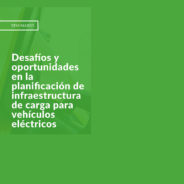Seminars appear in decreasing order in relation to date. To find an activity of your interest just go down on the list. Normally seminars are given in English. If not, they will be marked as Spanish Only.
El modelo de Kuramoto en grafos dinámicos aleatorios.
Resumen: Ver Pdf.
Modeling chemotaxis with a nonlinear Schrödinger equation: solitary waves.
Abstract: In this talk I will show how chemotaxis can be modeled by using a nonlinear Schrödinger equation with well-known quantum dissipative mechanisms. This relation will allow us to find explicit new solitary wave solutions.
Desafíos y oportunidades en la planificación de infraestructura de carga para vehículos eléctricos
En este seminario se discutirán desafíos y oportunidades en la planificación de infraestructura de carga para vehículos eléctricos. Destacados académicos nacionales, además de tomadores de decisiones del sector público, presentarán trabajos en temáticas relacionadas a la localización de centros de carga, optimización de redes eléctricas y de transporte.
Machine Covering in the Random-Order Model.
Abstract: n the Online Machine Covering problem, jobs, defined by their sizes, arrive one by one and have to be assigned to m parallel and identical machines, with the goal of maximizing the load of the least-loaded machine. Unfortunately, the classical model allows only fairly pessimistic performance guarantees: The best possible deterministic ratio of m is achieved by the Greedy-strategy, and the best known randomized algorithm has competitive ratio Õ(m^(1/2)), which cannot be improved by more than a logarithmic factor. In this talk, we...
Fractional Sobolev regularity for fully nonlinear elliptic equations.
Abstract: We study high-order fractional Sobolev regularity for fully nonlinear, uniformly elliptic equations, in the presence of unbounded source terms. Our techniques are based on touching the solution with C1,α cone-like functions to produce a decay rate of the measure of certain sets.
Homomorphisms between multidimensional substitutive subshifts.
ABSTRACT: Homomorphisms are topological factors between topological dynamical systems, up to GL(d,Z) transformation. This notion extends the classical dynamical ones like factor, conjugacies and automorphisms. While the automorphism group is the centralizer of the action group in the group of self-homeomorphisms in the phase space, the isomorphism group (invertible homomorphisms) is the normalizer of the action group. In this talk we will present some recent results about some rigidity properties of homomorphisms between substitutive...
SIR model with social gatherings
Abstract: We introduce an extension to Kermack and McKendrick’s classic susceptible-infected-recovered (SIR) model in epidemiology, whose underlying mechanism of infection consists of individuals attending randomly generated social gatherings. This gives rise to a system of ODEs where the force of infection term depends non-linearly on the proportion of infected individuals. Some specific instances yield models already studied in the literature, to which the present work provides a probabilistic foundation. The basic reproduction number...
Semi-random process.
Abstract: The semi-random graph process is a single-player game that begins with an empty graph on n vertices. In each round, a vertex u is presented to the player independently and uniformly at random. The player then adaptively selects a vertex v and adds the edge uv to the graph. For a fixed monotone graph property, the objective of the player is to force the graph to satisfy this property with high probability in as few rounds as possible. During the talk, we will focus on the following problems: a) perfect matchings, b) Hamilton cycles,...
Solution of the polynuclear growth model.
Abstract: The polynuclear growth model (PNG) is a model for crystal growth in one dimension. It is one of the most basic models in the KPZ universality class, and in the droplet geometry, it can be recast in terms of a Poissonized version of the longest increasing subsequence problem for a uniformly random permutation. In this talk, we will show how the multipoint distributions of the model can be expressed through solutions of a classical integrable system, the two-dimensional non-Abelian Toda lattice. In the appropriate scaling limit,...
Formalismo termodinámico en grupos sóficos
ABSTRACT: Dado un subshift \(X\) y una función continua \(f:X\rightarrow\mathbb{R}\) podemos definir dos nociones con significado físico. La primera es la de medida de Gibbs, que captura la idea de equilibrio local con el entorno. La segunda es la noción de medida de equilibrio, que captura la idea de maximizar el desorden globalmente. Un teorema de Lanford y Ruelle dice que si f es suficientemente regular y X es un subshift de tipo finito en \(\mathbb{Z}^d\), entonces las medidas de equilibrio son automáticamente medidas de Gibbs. En esta...




 Noticias en español
Noticias en español

